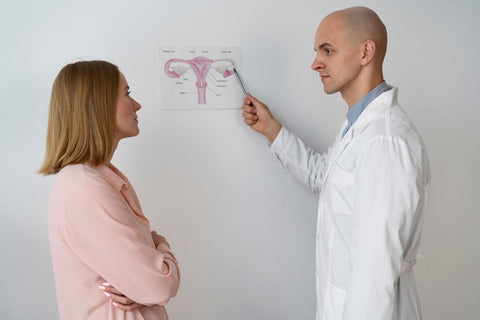The Difference Between PCOS and Regular Ovarian Cysts: Don't Get Me Wrong!

Two Commonly Misunderstood Gynecological Problems
Many women think PCOS and ovarian cysts are the same condition. However, they have fundamental differences in their causes, symptoms, and impact on fertility.
Understanding these differences is crucial for proper treatment , as even though the symptoms are similar, the treatment for PCOS and regular ovarian cysts is not the same.
What is PCOS?
PCOS (Polycystic Ovary Syndrome) is a hormonal disorder that causes an imbalance in female reproductive hormones . This condition causes the ovaries to produce excessive amounts of androgens (male hormones).
As a result, ovulation is disrupted and many small follicles are formed that do not develop properly —that's why it's called "polycystic".
Common Symptoms of PCOS:
● Irregular menstruation
● Severe acne
● Excessive body hair growth (hirsutism)
● Difficulty getting pregnant
● Difficulty losing weight
● Fatigue and mood swings
According to the Cleveland Clinic (outbound link), PCOS is one of the most common causes of infertility in women of childbearing age.
What is a Common Ovarian Cyst?
Meanwhile, ovarian cysts are fluid-filled sacs that form on the surface or inside the ovaries. Cysts often form naturally during the menstrual cycle , and most are harmless and disappear on their own.
Types of Ovarian Cysts:
● Functional cysts: most common, usually asymptomatic and self-limiting.
● Dermoid cyst: contains hair-like or fat-like tissue
● Endometriosis cyst (endometrioma): caused by endometrial tissue growing on the ovaries
● Cystadenoma: contains mucous fluid and can grow large
Comparison Table: PCOS vs. Common Ovarian Cysts
|
Aspect |
PCOS |
Common Ovarian Cysts |
|
Reason |
Hormonal & insulin disorders |
Temporary hormonal imbalance |
|
Number of cysts |
Many small cysts |
Usually one or two cysts |
|
Menstrual symptoms |
Infrequent or irregular menstruation |
Menstruation can be normal or slightly disturbed |
|
Fertility factors |
Can cause infertility |
Rarely causes infertility |
|
Treatment |
Need long-term management |
Often heals on its own without treatment |
|
The impact of hormones |
High androgen hormones |
Doesn't always interfere with hormones |
Why are they often confused?
Many women only discover they have PCOS after having an ultrasound and seeing numerous small "cysts" on their ovaries. This is where a common misconception arises.
In fact, cysts in PCOS are not true cysts , but rather follicles that fail to develop due to the absence of ovulation . Normal ovarian cysts, on the other hand, are fluid-filled sacs that can grow on their own, independent of ovulation .
How to Differentiate Correctly
To differentiate between the two, doctors will usually do:
-
Interview symptoms and menstrual history
-
Transvaginal or abdominal ultrasound examination
-
Blood tests to measure hormone levels, especially androgens and insulin
It is not recommended to self-diagnose without a medical examination because PCOS symptoms can resemble other conditions.
Management of PCOS and Ovarian Cysts
For PCOS:
● Regulate diet and lose weight
● Regular exercise
● Taking natural hormonal supplements
● Insulin therapy (if needed)
● Using birth control pills to stabilize the menstrual cycle
For natural support, you can try Herbal Menses Medicine – Menstrual Cycle Smoother and Menstrual Pain Relief. This product contains herbal ingredients that can help smooth menstruation and reduce mild hormonal symptoms such as those in early-stage PCOS.
For Ovarian Cysts:
● Routine observation via ultrasound
● Hormone administration if the cyst affects the cycle
● Minor surgery if the cyst enlarges, ruptures, or causes severe pain
When Should You Consult a Doctor?
See a doctor immediately if you experience:
● Lower abdominal pain that doesn't go away
● Menstruation does not come for more than 3 months
● The stomach feels full or swollen
● Excessive hormonal symptoms such as severe acne, hair loss, or facial hair growth appear.
● Difficulty getting pregnant after trying for more than 1 year
Closing
PCOS and ovarian cysts are both related to the ovaries, but they are medically distinct conditions. Understanding the difference is important to avoid misunderstandings and make informed health decisions.
If you experience similar symptoms, don't panic. The first step is a medical examination , followed by lifestyle changes and natural herbal remedies if needed.




